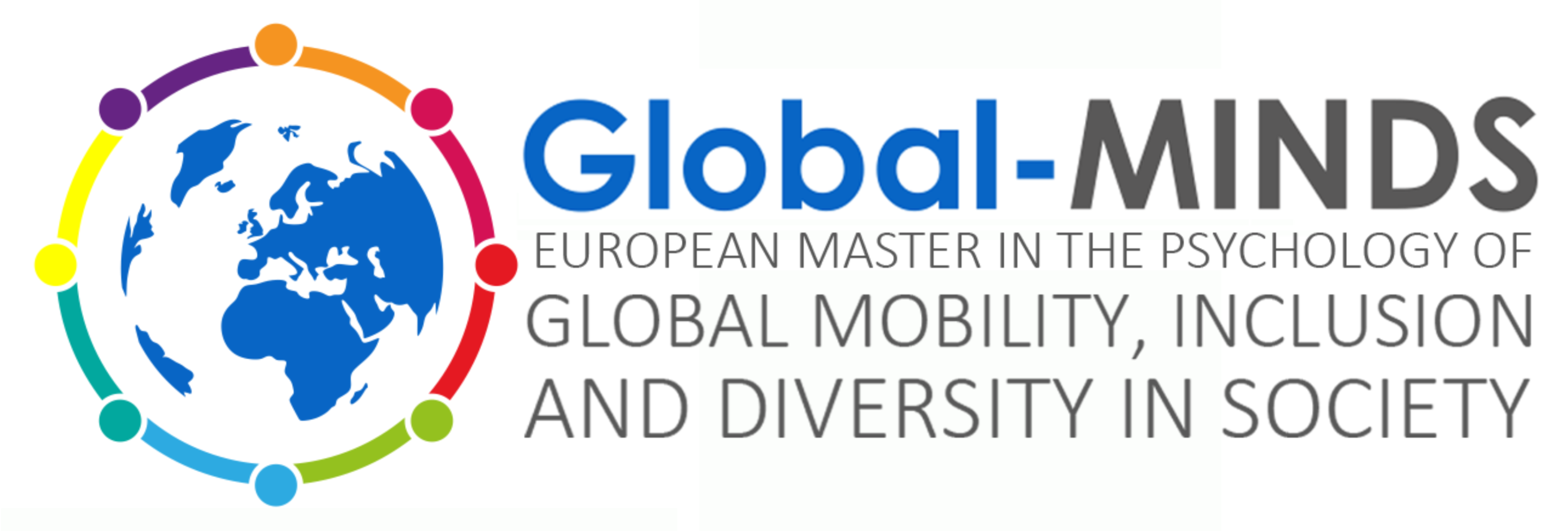Uma abordagem abrangente à discriminação: Prevalência e impacto como barreiras à inclusão dos migrantes
Coordenadora Global
Este projeto examina de forma abrangente a prevalência da discriminação percebida e as suas implicações para o bem-estar e a inclusão social entre os migrantes nascidos na CPLP em Portugal.
Mestrado Erasmus Mundus em Psicologia da Mobilidade Global, Inclusão e Diversidade na Sociedade
Coordenadora Local
O Global-MINDS integra conhecimentos da Psicologia Social e Cultural, oferecendo ensino internacional de alta qualidade, em inglês, sobre temas como migração, diversidade e inclusão, alinhados com os Objetivos de Desenvolvimento Sustentável da ONU. O programa tem como objetivo dotar os estudantes de conhecimento psicológico, sensibilidade cultural e excelência em investigação para enfrentarem desafios sociais complexos a nível global. A ligação entre teoria e prática é garantida através da dissertação de mestrado e do estágio.
O programa conjunto, totalmente acreditado, combina as áreas de Psicologia Social e Cultural de quatro programas nacionais de Mestrado, reunindo a experiência de todos os parceiros e proporcionando diversidade através de três percursos de mobilidade, um dos quais é um novo percurso com foco na saúde dos migrantes. O curso tem a duração de dois anos (120 ECTS). No primeiro semestre, os estudantes iniciam os seus estudos no Iscte – Instituto Universitário de Lisboa (Portugal) ou na SWPS University (Varsóvia, Polónia). No segundo semestre, transitam para a University of Limerick (Irlanda) ou para a University of Oslo (Noruega), frequentando ainda uma escola de verão conjunta.
No segundo ano, os estudantes realizam a dissertação de mestrado e um estágio numa ONG, organização ou agência intergovernamental.
Está disponível um total de 100 bolsas, das quais 40 são bolsas integrais e 60 correspondem a isenções das propinas. A ampla rede global de 30 parceiros associados (académicos e não académicos), bem como diversas outras, facilita a investigação internacional da dissertação e proporciona oportunidades de estágio.
ERASMUS MUNDUS EUROPEAN MASTER IN THE PSYCHOLOGY OF GLOBAL MOBILITY, INCLUSION AND DIVERSITY IN SOCIETY (GLOBAL-MINDS)
Coordenadora Global
O Global-MINDS integra conhecimentos da Psicologia Social e Cultural, oferecendo ensino internacional de alta qualidade, em inglês, sobre questões de migração, diversidade e inclusão, alinhadas com os Objetivos de Desenvolvimento Sustentável da ONU. O programa tem como objetivo dotar os estudantes de conhecimento psicológico, sensibilidade cultural e excelência em investigação para lidarem com problemas sociais complexos a nível global. A ligação entre teoria e prática é assegurada através da dissertação de mestrado e do estágio.
Este programa conjunto, totalmente acreditado, combina as áreas de Psicologia Social e Cultural de cinco programas nacionais de Mestrado, reunindo a experiência de todos os parceiros e oferecendo diversidade através de quatro percursos de mobilidade. O curso tem uma duração de dois anos (120 ECTS). No primeiro semestre, os estudantes iniciam os seus estudos no Iscte – Instituto Universitário de Lisboa (Portugal) ou na SWPS University (Varsóvia, Polónia). No segundo semestre, transitam para a University of Limerick (Irlanda), a University of Oslo (Noruega) ou a Koç University (Turquia), participando ainda numa escola de verão conjunta. No segundo ano, há a possibilidade de uma mobilidade adicional para a realização da dissertação e do estágio.
O programa disponibiliza um total de 58 bolsas EMJMD. A ampla rede global de 30 parceiros associados (académicos e não académicos), bem como várias outras colaborações (incluindo 19 académicos visitantes), facilita a investigação internacional da dissertação de mestrado e proporciona oportunidades de estágio.
Informação do Projeto
2016-09-26
2021-09-25
Parceiros do Projeto
- CIS-Iscte (PsyChange)
- UL - (Irlanda)
- UNIVERSITY OSLO - (Noruega)
- SWPS - (Polónia)
- Koç University - (Turquia)
Brave old world? The role of old age diversity in ageism
Investigadora Responsável
Investigador FCT_ChristinMelanieVauclair
Investigadora Responsável
The increasing ageing population inspires many to paint a gloomy picture of the future, with ageism being the main socio-psychological concern. Yet, this segment of the population is also becoming more diverse which provides both challenges and opportunities. More efforts need to be directed towards understanding old age diversity in ageism, i.e. the specific health risks of subgroups in the ageing population as well as the social psychological perception of old age subgroups in order to achieve better intergenerational relations.To fill this gap, two questions will be addressed: What is the role of ageism in successful ageing among a highly diverse older population? What kinds of old age subgroups do people perceive and how are they related to ageism? Study 1 and 2 respond to RQ1 with the aim to examine two steadily increasing old age subgroups in the population (older migrants). Studies 3 to 5 respond to RQ2 with the objective to scrutinize common lay beliefs about old age subgroups and to understand how specific subgroups (including the ones from Study 1, 2) are stereotyped taking into account contextual factors. The insight gained will be used in Study 6 in order to design a theory-guided and evidence-driven intervention programme aimed at emphasizing old age diversity and positive images about ageing. This project makes an important contribution by linking Health & Social psychology and including cultural, sociological and socioeconomic aspects of old age diversity and ageism.

 English
English


